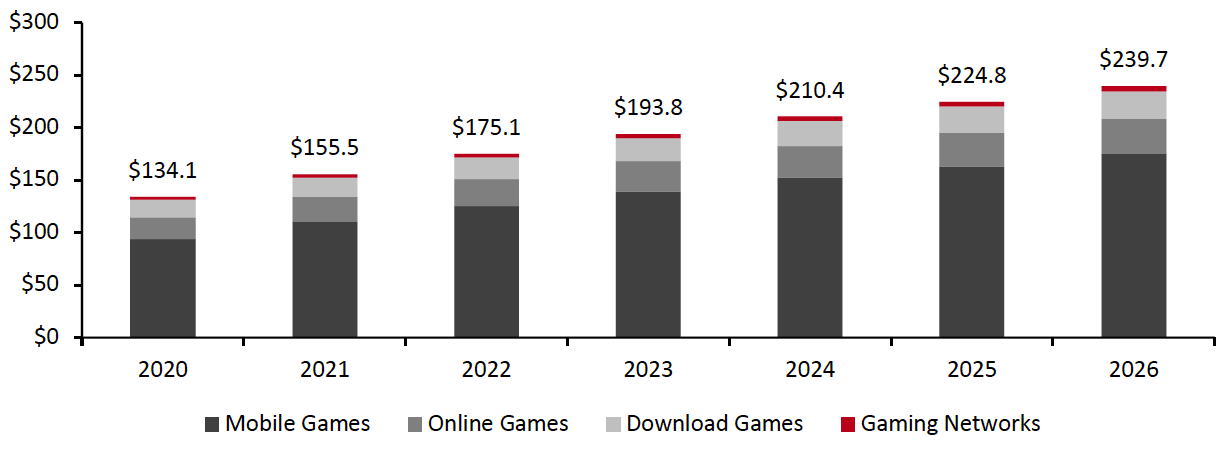
Nitheesh NH
FROM THE DESK OF DEBORAH WEINSWIG
Microsoft’s Activision Blizzard Acquisition Underscores That Gaming and Virtual Worlds Are the New Content Battleground Microsoft’s announcement this week that it will acquire Activision Blizzard in a transaction valued at $68.7 billion will take the software giant to third place (by revenue) in the global $175 billion digital gaming market—behind only Tencent and Sony, according to Microsoft. The $95-a-share offer represents a 45% premium to the acquiree’s January 14 closing price. Activision Blizzard is the home of franchises such as Call of Duty, Candy Crush, Diablo, Overwatch and Warcraft. The company also has a presence in esports through esports organization Major League Gaming. The huge acquisition price underscores the importance of gaming, a market projected to grow at a 9% CAGR between 2021 and 2026, taking it to $240 billion worldwide, per Statista (see Figure 1). On January 10, the maker of game Grand Theft Auto, Take-Two, announced its acquisition of rival Zynga (developer of FarmVille), valuing it at $12.7 billion—with the purchase price representing a 64% premium on Zynga’s January 7 closing price. On the Activision Blizzard deal, Phil Spencer, CEO of Microsoft Gaming, said, “Together, we will build a future where people can play the games they want, virtually anywhere they want.” That quote hints that Microsoft is seeking to become the “Netflix of gaming,” although others (not least Netflix itself) are competing in this space, too. In September 2021, Netflix said that it was “in the early stages of creating a great gaming experience” with the acquisition of Night School Studio. For Microsoft, the purchase comes on top of previous major acquisitions in gaming—including Minecraft-maker Mojang for $2.5 billion in 2014 and ZeniMax for $7.5 billion in 2020. We do not expect Apple to stand still, either. Already, about 70% of all App Store revenue comes from gaming apps, according to 2021 court documents cited by AppleInsider.com. However, those are not revenues from owned properties, but from third parties. Microsoft’s purchase is likely to prompt greater consideration of proprietary gaming interests at Apple, in turn fueled by acquisition/s of gaming giants.Figure 1. Global: Digital Video Games Market Revenue (USD Bil. at Current Exchange Rates) [caption id="attachment_139854" align="aligncenter" width="700"]
 Market revenue reflects revenues from fee-based and free video games and gaming networks, distributed online, downloaded and via apps. Physical game sales are excluded.
Market revenue reflects revenues from fee-based and free video games and gaming networks, distributed online, downloaded and via apps. Physical game sales are excluded.Source: Statista[/caption] The emergence of the metaverse, and the potential for convergence with gaming, only add further reasons to own the most compelling digital platforms. Gamers are already in versions of the metaverse—virtual worlds where consumers can travel and buy power-ups, apparel and other virtual goods with media such as NFTs (non-fungible tokens) and payment via cryptocurrencies. While it is still in its early stages, and widespread adoption is far from certain, the development of the metaverse appears to be the next step in the technology progression of the Internet. Should adoption of virtual worlds break out from the gaming sphere, brands and retailers will need to stand ready. Companies should take stock of the digital content they already possess with the goal of repurposing it in the metaverse. Retailers should also monitor the evolution of the metaverse and consider using it for virtual gatherings and creating virtual places (such as stores) for consumers to visit.
US RETAIL AND TECH HEADLINES
Elysewalker Launches E-Commerce Site (January 18) GlobeNewswire.com- High-end fashion retailer Elysewalker has introduced an e-commerce site that enables clients to interact online with one of the company’s stylists—bringing its popular personal styling services to the digital realm. with personalized and shoppable digital lookbooks.
- Elysewalker commissioned Hugo & Marie, a New York-based independent artist management firm and agency, for the creative design and development of the site.
- Private equity firm Inland Private Capital has sold two stores in the warehouse club chain BJ’s Warehouse, one each in Massachusetts and Baltimore. While the sale prices were not disclosed, Inland stated that the return to stakeholders was around 154%.
- Inland’s COO Keith Lampi stated that, throughout the pandemic, the company observed aggressive capitalization rate compression on essential business tenants such as warehouse clubs—especially in the triple-net lease segment. Given the potential for strong valuations, the company decided to put the portfolio up for sale.
- Apparel and footwear company Levi’s has announced the launch of Retail Insights, a custom-built app designed to provide stores, districts and countries with real-time access to intelligent data in North America.
- Retail Insights integrates inventory, product performance and sales metrics into a mobile app that provides requested data to store managers. The feature is designed to give managers more time on the store floor to interact with customers—rather than having to gain access to data files to check performance metrics and inventory.
- Parade, a direct-to-consumer underwear company, has created the first free recycling program for the underwear category in the US, called Second Life by Parade. The new initiative allows customers to return gently used underwear from any brand in exchange for a 20% Parade credit.
- Parade collaborated with waste management firm TerraCycle on the project. All returned items will be recycled into new products such as insulation, furniture and bedding.
- Convenience store chain Sheetz has implemented a unified retail planning system from RELEX Solutions, a provider of supply chain management software. The technology will help the retailer position itself for store and supply chain expansion.
- Susan Boyme, VP of Strategic Accounts at Sheetz, stated that RELEX’s software is designed to improve inventory optimization at the store level as well as further upstream—helping with managing promotions and fresh product inventory to reduce spoilage and out of stocks. Additionally, automating formerly manual processes, such as ordering, will assist in dealing with the current high cost of labor.
EUROPE RETAIL AND TECH HEADLINES
Aldi Introduces Its First Checkout-Free Store in the UK (January 18) WiltshireTimes.co.uk- German discount supermarket chain Aldi has launched its first checkout-free store, Shop&Go, in Greenwich, London.
- Customers will have to register with Aldi’s Shop&Go app, which enables them to pick up items in store, while cameras identify the products and charge them accordingly via their account as they exit. Customers will also be able to buy alcohol at the store, enabled using facial age estimation technology to determine if they look above the age of 25.
- Dutch department store chain De Bijenkorf has teamed up with delivery company Packaly on same-day delivery via bicycle for orders made before 2 p.m. within the applicable radius. De Bijenkorf has stated that the collaboration will contribute to its larger aim of becoming carbon neutral by 2040.
- The collaboration between De Bijenkorf and Packaly will serve customers in Amstelveen, Amsterdam, Eindhoven, The Hague, Maastricht, Rotterdam and Utrecht.
- East of England Co-operative Society, a UK-based independent retailer of food and specialist services, and Diebold Nixdorf (DN), an American financial and retail technology firm, have expanded their partnership. DN has installed over 180 of its self-service solutions in 80 of the company’s stores in East Anglia.
- The installed technology, DN Vynamic Self-Service, is an open-retail strategy with a flexible interface, enabling faster integration and better customization—retailers can add new capabilities without revamping their whole tech systems.
- Dutch online marketplace Orderchamp, which is aimed at independent brands and retailers, has opened its own distribution center in Venlo, the Netherlands, to service the European market. The distribution center spans approximately 54,000 square feet, with the potential to expand to 215,300 square feet.
- Orderchamp now enables retailers to completely outsource their fulfillment and focuses on combining orders when transporting packages from its distribution hub to the rest of Europe—making the distribution process more sustainable and cost-effective, according to the company.
- Poland-based convenience store chain Zabka now operates the largest chain of autonomous stores in Europe—it runs 25 artificial intelligence (AI)-powered stores in six countries under the Zabka Nano brand.
- The stores come in a variety of formats, including freestanding container-based vending machines, traditional brick-and-mortar locations and shop-in-shop locations—all of which rely on AI-powered computer vision technology developed in collaboration with AiFi, an American technology firm.
ASIA RETAIL AND TECH HEADLINES
Con Cung Secures $90 Million Investment (January 18) InsideRetail.asia- Vietnam-based maternity retailer Con Cung has received a $90 million investment from Quadria Capital, an Asian healthcare investment firm.
- The funds will be used to support Con Cung’s expansions plans—the company aims to open 2,000 stores by 2025 and to bolster its product portfolio. Additionally, the company plans to develop an all-in-one super app that will provide its customers with personalized products and services.
- India-based supply chain company Delhivery received approval from SEBI, the country’s capital markets regulator, for an initial public offering (IPO) of ₹74.6 billion ($100.0 million).
- The IPO will include the issuance of new equity shares worth ₹50.0 billion ($67.0 million) and an offer for sale worth ₹24.6 billion ($32.9 million) by existing shareholders. The funds raised will be used to finance organic growth initiatives and inorganic growth through acquisitions and other initiatives, alongside general corporate purposes.
- Vietnam-based social commerce startup Mio has raised $8 million in a Series A funding round led by Jungle Ventures. The company, which currently sells over 10,000 products per day, aims to fulfill 100,000 orders per day by the end of 2022.
- Mio intends to use the funds to open more fulfillment centers and expand into new cities in Vietnam—particularly in the northern region, which includes the country’s capital city, Hanoi.
- Nykaa, an India-based multi-brand beauty company, has launched a new series of live online shopping events to allow its mobile app users to buy goods used by influencers in real time as the company embraces live shopping.
- The series, which officially launched on January 18 with the brand’s “Nykaa Army” of influencers, will also include time-sensitive discounts, aiming to give a sense of urgency for viewers to drive purchases.
- Canadian multinational e-commerce company Shopify has partnered with e-commerce giant JD.com to assist US merchants to sell their products in China.
- This deal represents a significant move forward in Shopify’s China expansion as well as progress in the company’s internationalization efforts. JD.com stated it will open an “accelerated channel” for Shopify brands to sell in China, as well as handle price conversion and logistics from the US to China.